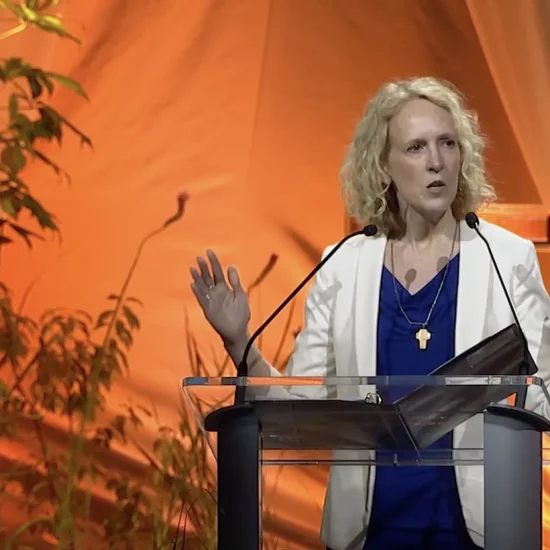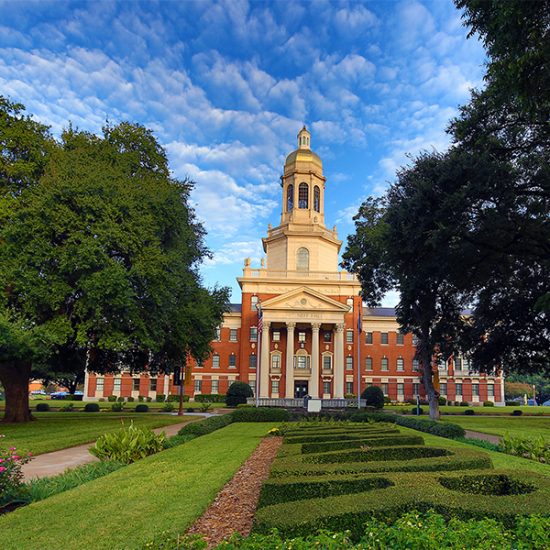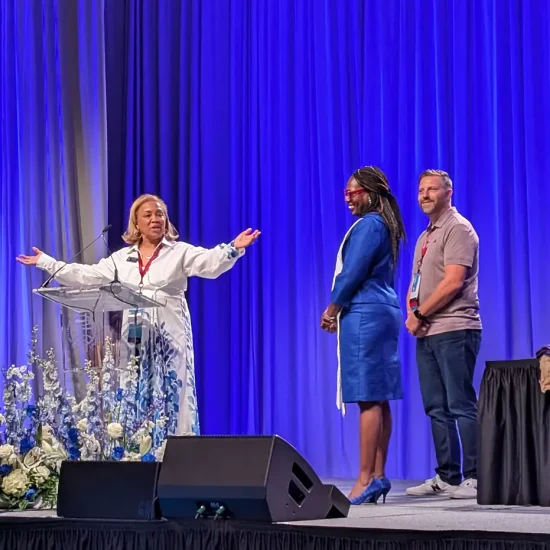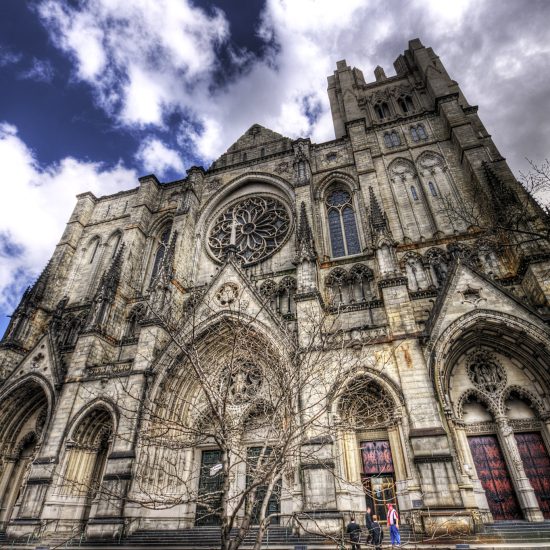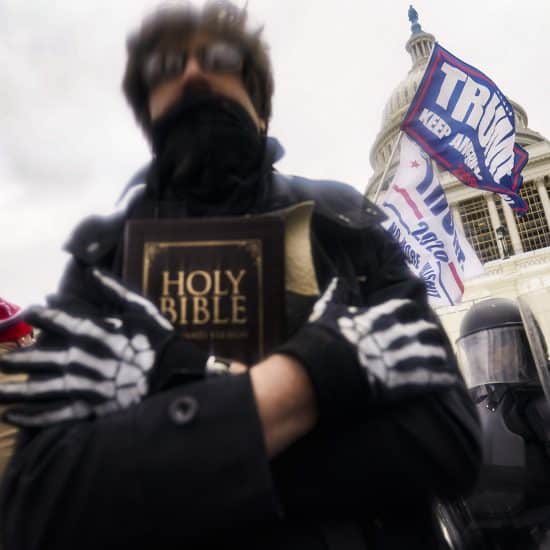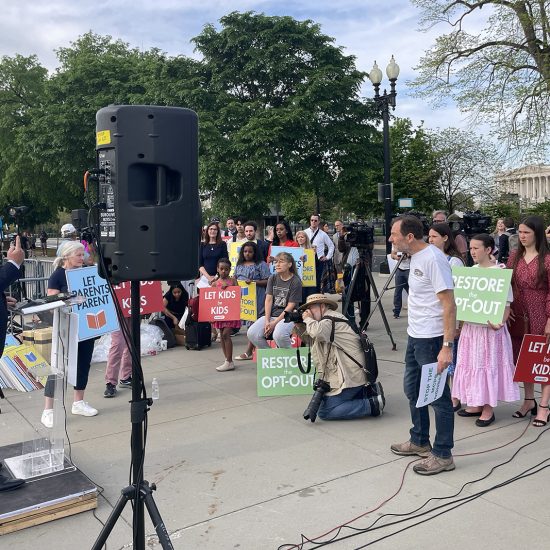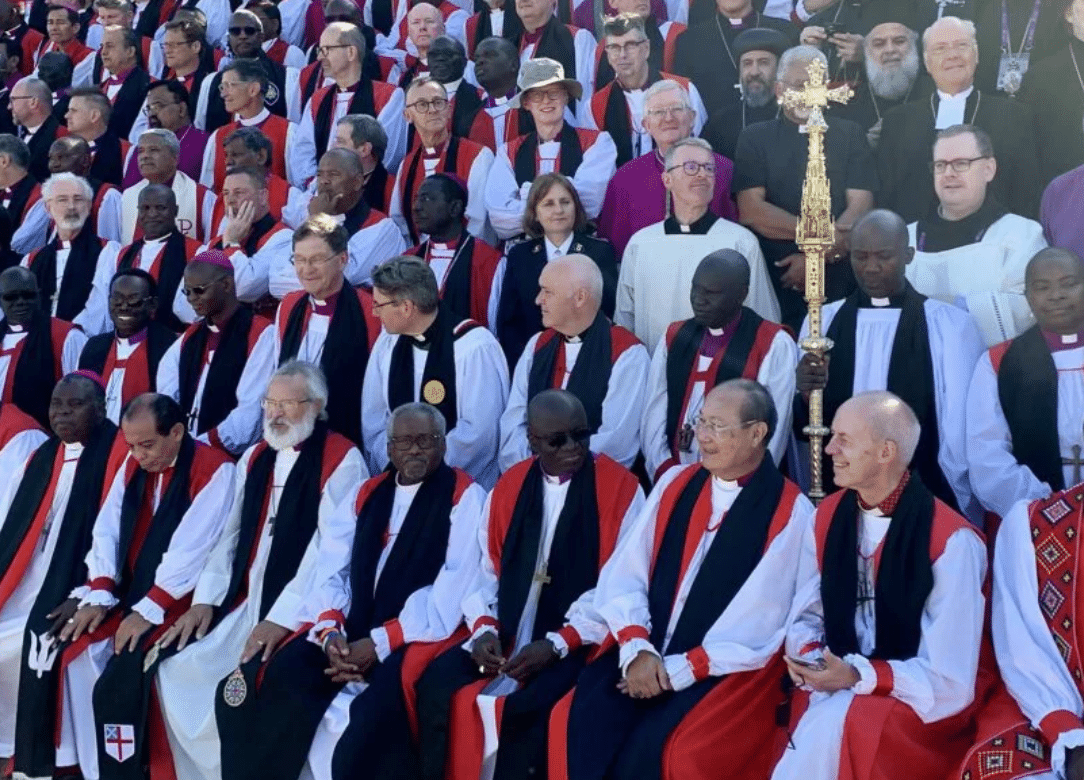
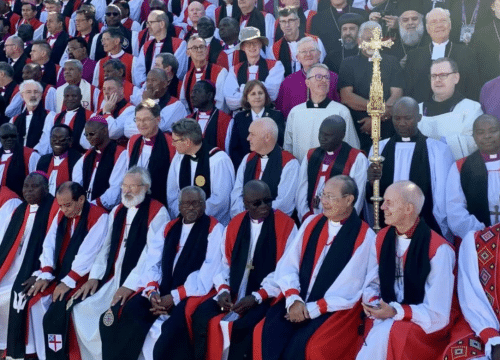
The Anglican bishops attending the Lambeth Conference prepare for their group photograph during the 2022 Lambeth Conference at the University of Kent in Canterbury, England, July 29, 2022. Photo by Neil Turner for the Lambeth Conference
CANTERBURY, England (RNS) — The prejudice felt by gay people over same-sex marriage is the new racism, according to the head of the Episcopal Church of the United States.
Michael Curry, presiding bishop of the Episcopal Church, in an interview with Religion News Service on Tuesday (Aug. 2), said that in the United States, “the issue of gay people and their rights is equivalent a struggle in our time to the one over race.” He went on to say all Christians in the United States need to stand in solidarity with gay people over same-sex marriage.
Curry was speaking in the aftermath of a key debate at the Lambeth Conference around the issue of same-sex marriage. The conference, meeting for the first time in 14 years, was supposed to be an attempt to bring the Anglican Communion together — to pray, listen and discuss issues that affect the church and the world, such as discipleship, climate change and poverty. More than 650 bishops registered to attend, including more than 100 from the Episcopal Church. They represent some 85 million Anglicans worldwide.
However, documents produced in advance of the conference, which runs through Monday, had provoked outrage among those belonging to the liberal wing of the church. Those documents included a reference to the entire Anglican Communion being wholly opposed to same-sex marriage. The protests forced Archbishop of Canterbury Justin Welby to amend the statement to recognize that some provinces support same-sex marriage.
In response to the amendment, bishops from the Global South announced they would refuse Holy Communion from bishops with gay partners and from those who support same-sex marriage.
The point-counterpoint protests over the past week have underscored the growing divisions between the bishops in the West who support gay marriage and those in the Global South who oppose it — and the increasingly tenuous cooperation that Welby, as archbishop of Canterbury, has forged.
Welby wrote to those attending the conference in advance of Tuesday’s discussion, describing same-sex marriage as “this matter on which we are so divided.” And during the debate Tuesday — held behind closed doors, with the media banned — he recognized the predicaments faced by both sides and the intractability of an issue on which everyone views a change of heart as unthinkable, according to a transcript released by the press office. Welby acknowledged that, for many present, to alter their position would make them a victim of derision, contempt and attack in their countries.
Welby affirmed that the 1998 Lambeth Conference 1.10 resolution, which rejects homosexuality as incompatible with Scripture, had not been rescinded. Even so, he said he would not punish provinces that back same-sex marriage nor seek to discipline or exclude them from the Communion.
There was no vote on the Human Dignity document, but Welby’s address gained a standing ovation from the Communion and was hailed as drawing out some of the toxicity of the issue. According to Curry: “There was some movement on the willingness of the bishops to respect our differences but at the same time hold fast to our respective convictions. I think that is a healthy thing because for people to be able to stay in relationship with profound differences is a kind of diversity. And we think diversity is a good thing.”
Welby said during his address that those who challenged traditional teaching “have not arrived lightly at their ideas that traditional teaching needs to change. They are not careless about Scripture. They do not reject Christ. But they have come to a different view on sexuality after long prayer, deep study and reflection on understandings of human nature.”
It was an approach Curry welcomed while also stressing that in the United States, clergy like himself had changed their views on same-sex unions through pastoral encounters with couples who wanted God’s blessing on their relationship and their family.
After the closed-door discussion on the Human Dignity paper, Archbishop Thabo Makgoba of Cape Town told journalists there had been “robust discussions and long and sustained prayer.”
“We could sit in a room and listen to a diversity of views and reflect together” — a far cry from the situation before the Lambeth Conference when bishops first received their draft of conference documents, called Lambeth Calls. Those documents included the statement: “It is the mind of the Anglican Communion as a whole that same-gender marriage is not permissible.”
The amended statement now notes that while many provinces ban same-gender marriages, other provinces “have blessed and welcomed same-sex union/marriage after careful theological reflection and a process of reception.”
This week’s Lambeth Conference, though, has a very different mood from the last Lambeth Conference 14 years ago.
Stephen Cottrell, the archbishop of York and the second most senior clergyman in the Church of England after the archbishop of Canterbury, recalled the tensions of the last Lambeth Conference over same-sex marriage. “This time, people aren’t threatening to leave. They are threatening to stay,” he told RNS on Wednesday.
For some supporters of gay unions, the lack of a decision in favor of same-sex marriage was a blow. But Mary Glasspool, an assistant bishop in New York and the first married lesbian bishop in the Anglican Communion, acknowledged there was progress of a kind. “The human dignity call was as good as it could get at this stage. We felt like we were treated as human beings, rather than as an issue.
“The archbishop of Canterbury had a high-wire act to perform and he succeeded. He didn’t fall off. I felt he was at his finest in keeping the Communion together, to listen,” she told RNS on Wednesday.
Out of the 42 Anglican provinces, those that have accepted same-sex marriage include the Episcopal Church in the United States; the Episcopal Anglican Church of Brazil; the Anglican Church of Canada; the Anglican Church in Aotearoa, New Zealand and Polynesia; the Scottish Episcopal Church; and the Church in Wales.
On Wednesday, the 650 bishops attending the Lambeth Conference left its base in Canterbury to travel to London for a day at the archbishop of Canterbury’s London home, Lambeth Palace, to discuss climate change. Welby said that “over the last few years, there is no doubt about the climate emergency for all of us.” And he warned that climate change would lead to food and water shortages, resulting in wars over supplies and causing what he called “a savage downward spiral” that would most affect people in the poorest parts of the planet.
The Lambeth Call paper on the environment highlighted that the Anglican Communion’s churches are involved in every part of the environmental emergency: “We are the people facing devastation in disaster-stricken communities. We are all the polluters, especially in wealthy countries. We are people living in poverty and on the margins. We wield power and influence.”
The bishops heard from Kenyan environmental activist Elizabeth Wathuti, who said people in Africa were on the front line of the climate emergency and they are “drowning in empty promises.” She insisted faith leaders could influence politicians to do more.
The Lambeth Call urged Anglican provinces to advocate for the poorest communities suffering the adverse effects of climate change.
Welby said the Church of England was aiming to disinvest from companies that are not pushing for carbon dioxide emissions to fall to net zero. He was also highly critical of oil companies such as Shell that have posted record profits at a time when people across the world are facing historic energy price hikes.
“Their windfall is causing indescribable hardship for people in the poorest countries and hardship for the poor here (in the U.K.) to have to heat or eat,” he said.
The bishops also watched a tree being planted in the Lambeth Palace Garden to mark the launch of the Communion Forest initiative, with trees planted across Communion provinces.

